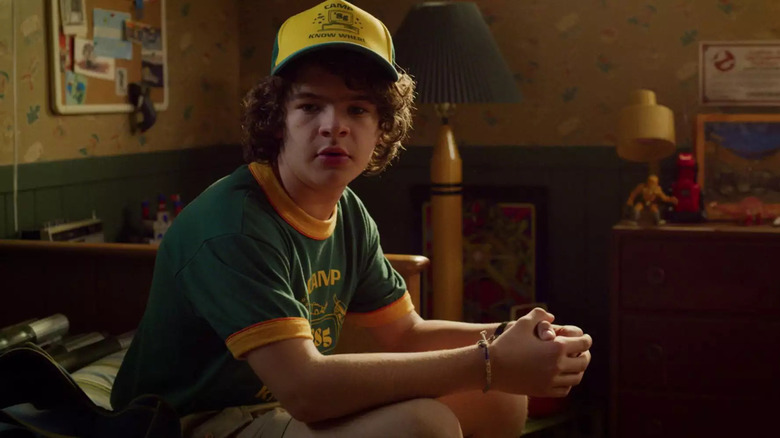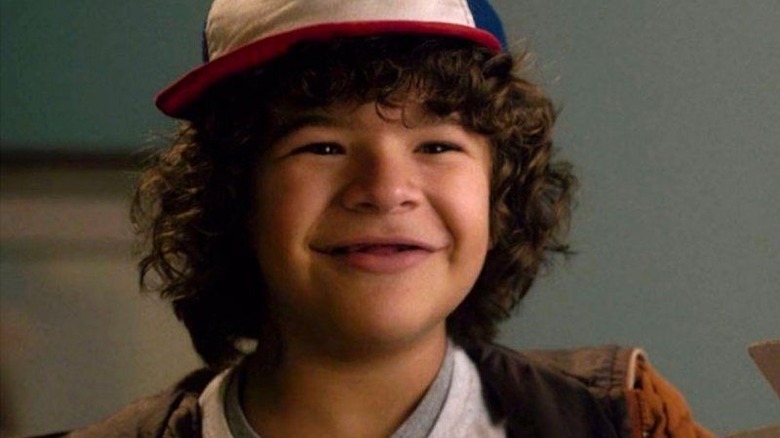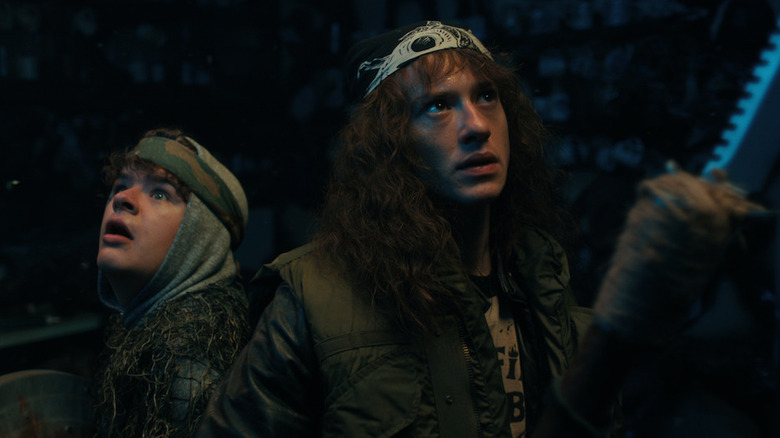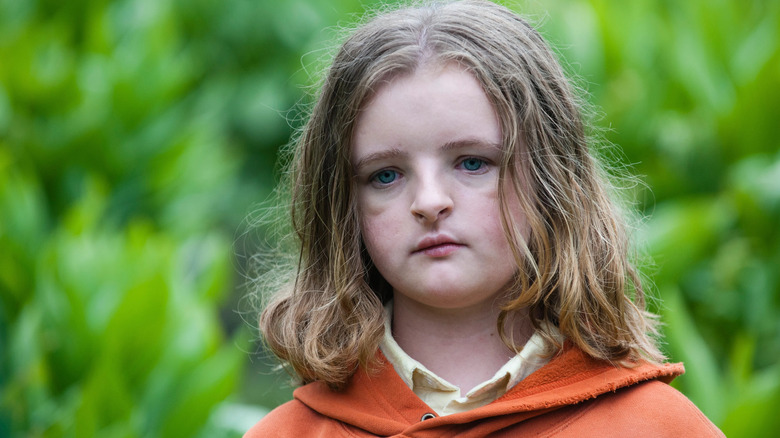How Gaten Matarazzo Has Used His Stranger Things Platform To Highlight A Rare Disease
No one could have imagined just how popular the Netflix series "Stranger Things" was to become when it debuted back in 2016. Having recently completed its fourth epic season, "Stranger Things" follows a group of kids in the 1980s who uncover the existence of supernatural forces and government corruption in their small Indiana town, forcing them on a dangerous adventure trying to solve the mysteries of what's really going on in Hawkins and save the world in the process. While the show has expanded to include new and useful characters, the heart of the adventures starts and ends with Eleven (Millie Bobby Brown) Will Byers (Noah Schnapp), Mike Wheeler (Finn Wolfhard), Lucas Sinclair (Caleb McLaughlin), and Dustin Henderson (Gaten Matarazzo).
The goofy group of underdogs represent the types of kids many viewers grew up as in school, unpopular dorks with a passion for movies, games, music, and media the other kids at school bullied them for loving. Shortly after we're introduced to the gang, we see Dustin Henderson getting mocked by some classmates for his appearance. "I told you a million times, my teeth are coming in! It's called cleidocranial dysplasia," Dustin says. This moment was not originally part of the script for "Stranger Things," and was added only after the casting of Matarazzo, who was born with the disorder. Matarazzo's cleidocranial dysplasia has become a known aspect of Dustin's character, and his representation on screen has helped introduce the public at large to the rare condition.
What is cleidocranial dysplasia?
According to John Hopkins Medical, cleidocranial dysplasia (CCD) is a rare genetic condition that affects teeth and bones, such as the skull, face, spine, collarbones and legs. The bones of those with CCD often form differently or may be more fragile than typical, and some bones are often completely absent — like the collarbone. Oftentimes, those with CCD are of short stature, and have distinctive facial features like a prominent forehead, and smaller teeth. "Stranger Things" creators The Duffer Brothers have included Dustin having CCD throughout the course of the show, as a means to show his character growth.
In season 1, Dustin doesn't have his front teeth, and proudly smiles to show off his gummy grin. Season 2 shows Dustin wearing prosthodontic teeth, commonly referred to as a "flipper." He often talks about his teeth clicking, showing that he's adjusting to having the piece in his mouth. By season 3, Dustin is often shown without his dentures, explained by his newfound relationship with Suzie (Gabriella Pizzolo), who allegedly believes that "Kissing without teeth is way better.” By including mentions of Dustin having CCD, audiences are able to see how his condition makes his life different from those without CCD, but that ultimately, he's just as capable as his friends. Hearing Dustin talk about adjusting to wearing his prosthodontic is no different than hearing another kid struggle with getting braces.
The ultimate CCD activist
Gaten Matarazzo has been very open about his condition, talking about it frequently on talk shows, on social media, and of course, through "Stranger Things." After the show's first season debut, scientists at Oklahoma State University discovered that global search interest in CCD spiked nearly 95 percent. Audiences loved the character, and wanted to learn more about his condition. Matarazzo has used his newly found fame to raise awareness for CCD and fundraise for CCD Smiles, a nonprofit organization that helps those with CCD pay for oral surgeries. "I never really felt different from anyone else throughout my childhood," Matarazzo said in an interview with Future of Personal Health. "My family helped me embrace my condition and feel confident, it never felt like an obstacle in my day-to-day life thanks to the people around me." He continued by saying, "I just want that to be the case for every kid growing up with CCD."
Matarazzo has also been quite transparent about his condition on social media, documenting the surgeries he's undergone to combat some of the effects of CCD. "I received such a wonderful wave of support from so many people," Matarazzo said. "And I saw that it had helped a lot of people learn about [CCD] for the first time. I like to think it's helped some people, so I think I'm going to keep updating throughout my process." His advocacy work has put CCD on a national spotlight, and he even participated in Lobby Day in Washington D.C. where dental students, faculty and professional dentists advocate for oral health care issues.
The CCD connection with Hereditary star Milly Shapiro
A few years after "Stranger Things" made waves, A24 released the masterful horror film "Hereditary," starring Toni Collette, Gabriel Byrne, Alex Wolff, and Milly Shapiro. Almost immediately, many people started to notice the similar facial features of Shapiro and Matarazzo. As it turns out, Shapiro also has CCD, and also works as an ambassador for CCD smiles. Unfortunately, while "Stranger Things" included Matarazzo's CCD as a representative trait of the character, Shapiro's CCD was often viewed as "monstrous" in the marketing for the film. The film was critically lauded and is considered one of the best horror films of the decade, but Shapiro's appearance was mocked relentlessly, with many attributing the way CCD shaped her face as being "ugly."
Fortunately, Shapiro isn't one to let the haters get her down, and has become extremely popular on TikTok where she often makes videos about CCD, queerness, memes about "Hereditary," and the music she makes with her sister Abi Monterey ("Doom Patrol"), who also has CCD. Thanks to the joint visibility of Gaten Matarazzo, Milly Shapiro, and Abi Monterey, access to financial support for those living with CCD are at an all time high. It's amazing what a little representation can do.



